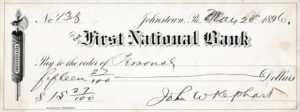A colleague has a side business where he takes in cash from customers all over the country. Since banks consider this activity “too high risk,” they’ve closed a couple of his accounts. A very large bank just closed his most recent account without warning. This bank has been keeping $36,000 of his money from him for 7 weeks while they “investigate.” He told me he was going to talk to a lawyer about getting his money returned.
I replied, “I’m afraid it is not your money at all. The moment you give a penny to a bank, it is theirs to do with as they please. Legally, it is no longer your money; you are an unsecured creditor. They decide if and when to repay your deposit/loan after they take as long as they desire to investigate.” He replied, “Wow, that’s terrifying. I did not know that. I won’t leave that much money in a bank in the future.”
After the 2008 financial crisis, Central Bankers examined how they could avoid the expense of bailing out failing banks in the future. They came up with a solution, nicknamed, a “Bail In” as opposed to a government Bail Out. This is where depositors have a percentage of their money taken from them and handed to the equity in the bank to raise capital. For example, if you had $20,000 in your savings account and the bail in was for 15% then $3,000 of your savings is taken from you and handed to the equity investors of the bank (mainly to make up for losses on failing loans).
There have been bank bail-ins already in: Denmark, Austria, Cyprus, Portugal, and Greece. The European Union setup the rules for bank bail-ins and the G20 nations passed a joint resolution (including the U.S.) in November 2014. The resolution states that, “all bank deposits are now part of the capital structure,” meaning deposits are a lower-priority creditor to the bank.
But in the U.S., aren’t depositors protected by F.D.I.C. insurance up to $250,000 per account? Yes, these accounts are insured by the federal government. However, the F.D.I.C. only has $54B to insure over $6T in deposits, less than 1% of the money in a worse-case scenario. So it is insured, but that insurance is HIGHLY underfunded. The failure of one large bank could blow-out the entire F.D.I.C. fund many times over.
So, the summary of all of this is:
- Any money you deposit with a bank is no longer yours; you are an unsecured creditor to the bank.
- Your bank deposits are is insured up to $250,000 per account, but the insurance may not be there in a big recession or financial crisis.
- There is a possibility that a portion of your bank deposits may be taken as part of a bank-bail in in case your bank suffers too many losses. Of course, the money taken will never be returned to you.

